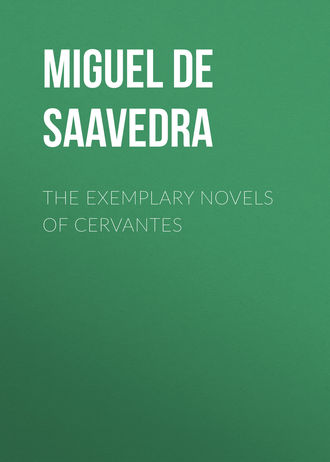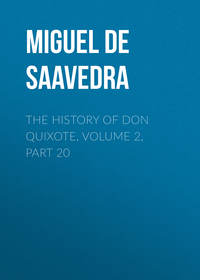 полная версия
полная версияThe Exemplary Novels of Cervantes
The alguazil, in despair at finding that the Breton had no money to bribe with, thought to indemnify himself by extorting something from the mistress of the house. He called for her, and in she came half dressed, and when she saw and heard the Breton bawling for his money, Colindres crying in her shift, the alguazil storming, the attorney in a passion, and the bailiffs ransacking the room, she was in no very good humour. The alguazil ordered her to put on her clothes and be off with him to prison, for allowing men and women to meet for bad purposes in her house. Then indeed the row grew more furious than ever. "Señor Alguazil and Señor Attorney," said the hostess, "none of your tricks upon me, for I know a thing or two, I tell you. Give me none of your blustering, but shut your mouth, and go your ways in God's name, otherwise by my faith I'll pitch the house out of the windows, and blow upon you all; for I am well acquainted with the Señora Colendres, and I know moreover that for many months past she has been kept by the Señor Alguazil; so don't provoke me to let out any more, but give this gentleman back his money, and let us all part good friends, for I am a respectable woman, and I have a husband with his patent of nobility with its leaden seals all hanging to it, God be thanked! and I carry on this business with the greatest propriety. I have the table of charges hung up where everybody may see it, so don't meddle with me, or by the Lord I'll soon settle your business. It is no affair of mine if women come in with my lodgers; they have the keys of their rooms, and I am not a lynx to see through seven walls."
My masters were astounded at the harangue of the landlady, and at finding how well acquainted she was with the story of their lives; but seeing there was nobody else from whom they could squeeze money, they still pretended that they meant to drag her to prison. She appealed to heaven against the unreasonableness and injustice of their behaving in that manner when her husband was absent, and he too a man of such quality. The Breton bellowed for his fifty crowns; the bailiffs persisted in declaring that they had never set eyes on the breeches, God forbid! The attorney privately urged the alguazil to search Colindres' clothes, for he suspected she must have possessed herself of the fifty crowns, since it was her custom to grope in the pockets of those who took up with her company. Colindres declared that the Breton was drunk, and that it was all a lie about his money. All in short was confusion, oaths, and bawling, and there would have been no end to the uproar if the lieutenant corregidor had not just then entered the room, having heard the noise as he was going his rounds. He asked what it was all about, and the landlady replied with great copiousness of detail. She told him who was the damsel Colindres (who by this time had got her clothes on), made known the connection between her and the alguazil, and exposed her plundering tricks; protested her own innocence, and that it was never with her consent that a woman of bad repute had entered her house; cried herself up for a saint, and her husband for a pattern of excellence; and called out to a servant wench to run and fetch her husband's patent of nobility out of the chest, that she might show it to the Señor Lieutenant. He would then be able to judge whether the wife of so respectable a man was capable of anything but what was quite correct. If she did keep a lodging-house, it was because she could not help it. God knows if she would not rather have some comfortable independence to live upon at her ease. The lieutenant, tired of her volubility and her bouncing about the patent of gentility, said to her, "Sister hostess, I am willing to believe that your husband is a gentleman, but then you must allow he is only a gentleman innkeeper." The landlady replied with great dignity, "And where is the family in the world, however good its blood may be, but you may pick some holes in its coat?" "Well, all I have to say, sister, is, that you must put on your clothes, and come away to prison." This brought her down from her high flights at once; she tore her hair, cried, screamed, and prayed, but all in vain; the inexorable lieutenant carried the whole party off to prison, that is to say, the Breton, Colindres, and the landlady. I learned afterwards that the Breton lost his fifty crowns, and was condemned besides to pay costs; the landlady had to pay as much more. Colindres was let off scot free, and the very day she was liberated she picked up a sailor, out of whom she made good her disappointment in the affair of the Breton. Thus you see, Scipio, what serious troubles arose from my gluttony.
Scip. Say rather from the rascality of your master.
Berg. Nay but listen, for worse remains to be told, since I am loth to speak ill of alguazil and attorneys.
Scip. Ay, but speaking ill of one is not speaking ill of all. There is many and many an attorney who is honest and upright. They do not all take fees from both parties in a suit; nor extort more than their right; nor go prying about into other people's business in order to entangle them in the webs of the law; nor league with the justice to fleece one side and skin the other. It is not every alguazil that is in collusion with thieves and vagabonds, or keeps a decoy-duck in the shape of a mistress, as your master did. Very many of them are gentlemen in feeling and conduct; neither arrogant nor insolent, nor rogues and knaves, like those who go about inns, measuring the length of strangers' swords, and ruining their owners if they find them a hair's breadth longer than the law allows.60
Berg. My master hawked at higher game. He set himself up for a man of valour, piqued himself on making famous captures, and sustained his reputation for courage without risk to his person, but at the cost of his purse. One day at the Puerta de Xeres he fell in, single-handed, with six famous bravoes, whilst I could not render him any assistance, having a muzzle on my mouth, which he made me wear by day and took off at night. I was amazed at his intrepidity and headlong valour. He dashed in and out between the six swords of the ruffians, and made as light of them as if they were so many osier wands. It was wonderful to behold the agility with which he assaulted, his thrusts and parries, and with what judgment and quickness of eye he prevented his enemies from attacking him from behind. In short, in my opinion and that of all the spectators of the fight, he was a very Rhodomont, having fought his men all the way from the Puerta de Xeres to the statues of the college of Maese Rodrigo, a good hundred paces and more. Having put them to flight, he returned to collect the trophies of the battle, consisting of three sheaths, and these he carried to the corregidor, who was then, if I mistake not, the licentiate Sarmiento de Valladares, renowned for the destruction of the Sauceda.61 As my master walked through the streets, people pointed to him and said, "There goes the valiant man who ventured, singly, to encounter the flower of the bravoes of Andalusia."
He spent the remainder of the day in walking about the city, to let himself be seen, and at night we went to the suburb of Triana, to a street near the powder-mill, where my master, looking about to see if any one observed him, entered a house, myself following him, and in the court-yard we found the six rogues he had fought with, all untrussed, and without cloaks or swords. One fellow, who appeared to be the landlord, had a big jar of wine in one hand and a great tavern goblet in the other, and, filling a sparkling bumper, he drank to all the company. No sooner had they set eyes on my master than they all ran to him with open arms. They all drank his health, and he returned the compliment in every instance, and would have done it in as many more had there been occasion – so affable he was and so averse to disoblige any one for trifles. Were I to recount all that took place there – the supper that was served up, the fights and the robberies they related, the ladies of their acquaintance whom they praised or disparaged, the encomiums they bestowed on each other, the absent bravoes whom they named, the clever tricks they played, jumping up from supper to exhibit their sleight of hand, the picked words they used, and, finally, the figure of the host, whom all respected as their lord and father, – were I to attempt this, I should entangle myself in a maze, from which I could never extricate myself. I ascertained that the master of the house, whose name was Monipodio, was a regular fence, and that my master's battle of the morning had been preconcerted between him and his opponents, with all its circumstances, including the dropping of the sword-sheaths, which my master now delivered, in lieu of his share of the reckoning. The entertainment was continued almost till breakfast time; and, by way of a final treat, they gave my master information of a foreign bravo, an out-and-outer, just arrived in the city. In all probability he was an abler blade than themselves, and they denounced him from envy. My master captured him the next night as he lay in bed; but had he been up and armed, there was that in his face and figure which told me that he would not have allowed himself to be taken so quietly. This capture, coming close upon the heels of the pretended fight, enhanced the fame of my poltroon of a master, who had no more courage than a hare, but sustained his valorous reputation by treating and feasting; so that all the gains of his office, both fair and foul, were frittered away upon his false renown.
I am afraid I weary you, Scipio, but have patience and listen to another affair that befel him, which I will tell you without a tittle more or less than the truth. Two thieves stole a fine horse in Antequera, brought him to Seville, and in order to sell him without risk, adopted what struck me as being a very ingenious stratagem. They put up at two different inns, and one of them entered a plaint in the courts of law, to the effect that Pedro de Losada owed him four hundred reals, money lent, as appeared by a note of hand, signed by the said Pedro, which he produced in evidence. The lieutenant corregidor directed that Losada should be called upon to state whether or not he acknowledged the note as his own, and if he did, that he should be compelled to pay the amount by seizure of his goods, or go to prison. My master and his friend the attorney were employed in this business. One of the thieves took them to the lodgings of the other, who at once acknowledged his note of hand, admitted the debt, and offered his horse in satisfaction of the amount. My master was greatly taken with the animal, and resolved to have it if it should be sold. The time prescribed by the law being expired, the horse was put up for sale; my master employed a friend to bid for it, and it was knocked down to him for five hundred reals, though well worth twelve or thirteen hundred. Thus one thief obtained payment of the debt which was not due to him, the other a quittance of which he had no need, and my master became possessed of the horse, which was as fatal to him as the famous Sejanus62 was to his owners.
The thieves decamped at once; and two days afterwards my master, after having repaired the horse's trappings, appeared on his back in the Plaza de San Francisco, as proud and conceited as a bumpkin in his holiday clothes. Everybody complimented him on his bargain, declaring the horse was worth a hundred and fifty ducats as surely as an egg was worth a maravedi. But whilst he was caracolling and curvetting, and showing off his own person and his horse's paces, two men of good figure and very well dressed entered the square, one of whom cried out, "Why, bless my soul! that is my horse Ironfoot, that was stolen from me a few days ago in Antequera." Four servants, who accompanied him, said the same thing. My master was greatly chopfallen; the gentleman appealed to justice, produced his proofs, and they were so satisfactory that sentence was given in his favour, and my master was dispossessed of the horse. The imposture was exposed; and it came out how, through the hands of justice itself, the thieves had sold what they had stolen; and almost everybody rejoiced that my master's covetousness had made him burn his fingers.
His disasters did not end there. That night the lieutenant going his rounds, was informed that there were robbers abroad as far as San Julian's wards. Passing a cross-road he saw a man running away, and taking me by the collar, "At him, good dog!" he said, "At him, boy!" Disgusted as I was with my master's villanies, and eager to obey the lieutenant's orders, I made no hesitation to seize my own master and pull him down to the ground, where I would have torn him to pieces if the thief-takers had not with great difficulty separated us. They wanted to punish me, and even to beat me to death with sticks; and they would have done so if the lieutenant had not bade them let me alone, for I had only done what he ordered me. The warning was not lost upon me, so without taking my leave of anybody, I leaped through an opening in the wall, and before daybreak I was in Mayrena, a place about four leagues from Seville.
There by good luck I fell in with a party of soldiers, who, as I heard, were going to embark at Cartagena. Among them were four of my late master's ruffian friends; one of them was the drummer, who had been a catchpole and a great buffoon, as drummers frequently are. They all knew me and spoke to me, asking after my master as if I could reply; but the one who showed the greatest liking for me was the drummer, and so I determined to attach myself to him, if he would let me, and to accompany the expedition whether they were bound for Italy or Flanders. For in spite of the proverb, a blockhead at home is a blockhead all the world over, you must agree with me that travelling and sojourning among various people makes men wise.
Scip. That is so true that I remember to have heard from a master of mine, a very clever man, that the famous Greek, Ulysses, was renowned as wise solely because he had travelled and seen many men and nations. I therefore applaud your determination to go with the soldiers, wherever they might take you.
Berg. To help him in the display of his jugglery, the drummer began to teach me to dance to the sound of the drum, and to play other monkey tricks such as no other dog than myself could ever have acquired. The detachment marched by very short stages; we had no commissary to control us; the captain was a mere lad, but a perfect gentleman, and a great christian; the ensign had but just left the page's hall at the court; the serjeant was a knowing blade, and a great conductor of companies from the place where they were raised to the port of embarkation. The detachment was full of ruffians whose insolent behaviour, in the places through which we passed, redounded in curses directed to a quarter where they were not deserved. It is the misfortune of the good prince to be blamed by some of his subjects, for faults committed by others of them, which he could not remedy if he would, for the circumstances attendant on war are for the most part inevitably harsh, oppressive, and untoward.
In the course of a fortnight, what with my own cleverness, and the diligence of him I had chosen for my patron, I learned to jump for the king of France, and not to jump for the good-for-nothing landlady; he taught me to curvet like a Neapolitan courser, to move in a ring like a mill horse, and other things which might have made one suspect that they were performed by a demon in the shape of a dog. The drummer gave me the name of the wise dog, and no sooner were we arrived at a halting place, than he went about, beating his drum, and giving notice to all who desired to behold the marvellous graces and performances of the wise dog, that they were to be seen at such a house, for four or eight maravedis a head, according to the greater or less wealth of the place. After these encomiums everybody ran to see me, and no one went away without wonder and delight. My master exulted in the gains I brought him, which enabled him to maintain six of his comrades like princes. The envy and covetousness of the rogues was excited, and they were always watching for an opportunity to steal me, for any way of making money by sport has great charms for many. This is why there are so many puppet showmen in Spain, so many who go about with peep shows, so many others who hawk pens and ballads, though their stock, if they sold it all, would not be enough to keep them for a day; and yet they are to be found in taverns and drinking-shops all the year round, whence I infer that the cost of their guzzling is defrayed by other means than the profits of their business. They are all good-for-nothing vagabonds, bread weevils and winesponges.
Scip. No more of that, Berganza; let us not go over the same ground again. Continue your story, for the night is waning, and I should not like, when the sun rises, that we should be left in the shades of silence.
Berg. Keep it and listen. As it is an easy thing to extend and improve our inventions, my master, seeing how well I imitated a Neapolitan courser, made me housings of gilt leather, and a little saddle, which he fitted on my back; he put on it a little figure of a man, with lance in hand, and taught me to run straight at a ring fixed between two stakes. As soon as I was perfect in that performance, my master announced that on that day the wise dog would run at the ring, and exhibit other new and incomparable feats, which, indeed, I drew from my own invention, not to give my master the lie. We next marched to Montilla, a town belonging to the famous and great christian, Marquis of Priego, head of the house of Aguilar and Montilla. My master was quartered, at his own request, in a hospital; he made his usual proclamation, and as my great fame had already reached the town, the court-yard was filled with spectators in less than an hour. My master rejoiced to see such a plenteous harvest, and resolved to show himself that day a first-rate conjuror. The entertainment began with my leaping through a hoop. He had a willow switch in his hand, and when he lowered it, that was a signal for me to leap; and when he kept it raised, I was not to budge.
On that day (for ever memorable in my life) he began by saying, "Come, my friend, jump for that juvenile old gentleman, you know, who blacks his beard; or, if you won't, jump for the pomp and grandeur of Donna Pimpinela de Plafagonia, who was the fellow servant of the Galician kitchen wench at Valdeastillas. Don't you like that, my boy? Then jump for the bachelor Pasillas, who signs himself licentiate without having any degree. How lazy you are! Why don't you jump? Oh! I understand! I am up to your roguery! Jump, then, for the wine of Esquivias, a match for that of Ciudad Real, St. Martin, and Rivadavia." He lowered the switch, and I jumped in accordance with the signal. Then, addressing the audience, "Do not imagine, worshipful senate," he said, "that it is any laughing matter what this dog knows. I have taught him four-and-twenty performances, the least of which is worth going thirty leagues to see. He can dance the zaraband and the chacona better than their inventor; he tosses off a pint of wine without spilling a drop; he intones a sol, fa, mi, re, as well as any sacristan. All these things, and many others which remain to be told, your worships shall witness during the time the company remains here. At present, our wise one will give another jump, and then we will enter upon the main business."
Having inflamed the curiosity of the audience, or senate, as he called them, with this harangue, he turned to me and said, "Come now, my lad, and go through all your jumps with your usual grace and agility; but this time it shall be for the sake of the famous witch who is said to belong to this place." The words were hardly out of his mouth, when the matron of the hospital, an old woman, who seemed upwards of seventy, screamed out, "Rogue, charlatan, swindler, there is no witch here. If you mean Camacha, she has paid the penalty of her sin, and is where God only knows; if you mean me, you juggling cheat, I am no witch, and never was one in my life; and if I ever was reputed to be a witch, I may thank false witnesses, and the injustice of the law, and a presumptuous and ignorant judge. All the world knows the life of penance I lead, not for any acts of witchcraft, which I have never done, but for other great sins which I have committed as a poor sinner. So get out of the hospital, you rascally sheep-skin thumper, or by all the saints I'll make you glad to quit it at a run." And with that she began to screech at such a rate, and pour such a furious torrent of abuse upon my master, that he was utterly confounded. In fine, she would not allow the entertainment to proceed on any account. My master did not care much about the row, as he had his money in his pocket, and he announced that he would give the performance next day in another hospital. The people went away cursing the old woman, and calling her a witch, and a bearded hag into the bargain. We remained for all that in the hospital that night, and the old woman meeting me alone in the yard, said, "Is that you, Montiel, my son? Is that you?" I looked up as she spoke, and gazed steadily at her, seeing which, she came to me with tears in her eyes, threw her arms round my neck, and would have kissed my mouth if I had allowed her; but I was disgusted, and would not endure it.
Scip. You were quite right, for it is no treat, but quite the reverse, to kiss or be kissed by an old woman.
Berg. What I am now going to relate I should have told you at the beginning of my story, as it would have served to diminish the surprise we felt at finding ourselves endowed with speech. Said the old woman to me, "Follow me, Montiel, my son, that you may know my room; and be sure you come to me to-night, that we may be alone together, for I have many things to tell you of great importance for you to know." I drooped my head in token of obedience, which confirmed her in her belief that I was the dog Montiel whom she had been long looking for, as she afterwards told me. I remained bewildered with surprise, longing for the night to see what might be the meaning of this mystery or prodigy, and as I had heard her called a witch, I expected wonderful things from the interview. At last the time came, and I entered the room, which was small, and low, and dimly lighted by an earthenware lamp. The old woman trimmed it, sat down on a chest, drew me to her, and without speaking a word, fell to embracing me, and I to taking care that she did not kiss me.
"I did always hope in heaven," the old woman began, "that I should see my son before my eyes were closed in the last sleep; and now that I have seen you, let death come when it will, and release me from this life of sorrow. You must know, my son, that there lived in this city the most famous witch in the world, called Camacha de Montilla. She was so perfect in her art, that the Erichtheas, Circes, and Medeas, of whom old histories, I am told, are full, were not to be compared to her. She congealed the clouds when she pleased, and covered the face of the sun with them; and when the whim seized her, she made the murkiest sky clear up at once. She fetched men in an instant from remote lands; admirably relieved the distresses of damsels who had forgot themselves for a moment; enabled widows to console themselves without loss of reputation; unmarried wives, and married those she pleased. She had roses in her garden in December, and gathered wheat in January. To make watercresses grow in a handbasin was a trifle to her, or to show any persons whom you wanted to see, either dead or alive, in a looking-glass, or on the nail of a newborn infant. It was reported that she turned men into brutes, and that she made an ass of a sacristan, and used him really and truly in that form for six years. I never could make out how this was done; for as for what is related of those ancient sorceresses, that they turned men into beasts, the learned are of opinion that this means only that by their great beauty and their fascinations, they so captivated men and subjected them to their humours, as to make them seem unreasoning animals. But in you, my son, I have a living instance to the contrary, for I know that you are a rational being, and I see you in the form of a dog; unless indeed this is done through that art which they call Tropelia, which makes people mistake appearances and take one thing for another.









